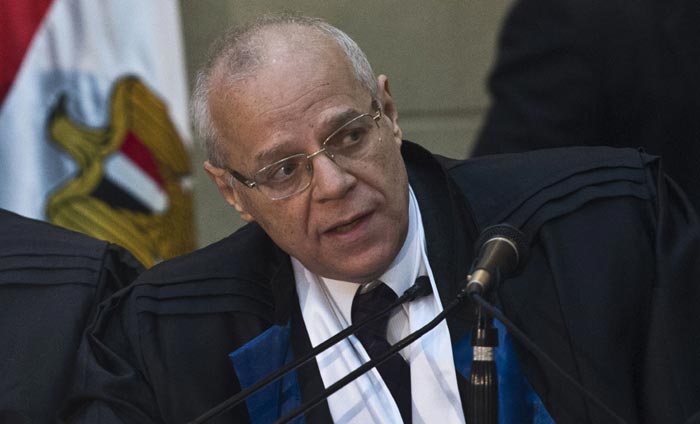Egyptian judge Anwar al-Asy attends a session at the Supreme Constitutional Court in Cairo last week. The court ruled on Sunday that an article in a law defining voting districts was unconstitutional.
Reuters/AFP/Cairo
Egypt's Supreme Constitutional Court ruled on Sunday that an article in a law defining voting districts was unconstitutional, opening the way for a possible delay in a long-awaited March-April parliamentary poll.
Egypt has been without a parliament since June 2012 when a court dissolved the democratically elected main chamber, reversing a major accomplishment of the 2011 uprising that toppled autocrat Hosni Mubarak.
"The court ruled that Article 3 in Presidential Decree Law 202 for 2014 on dividing constituencies in the parliamentary election ... was unconstitutional," said judge Anwar al-Asy.
The Administrative Court is due to meet later this month to rule on whether the election will be delayed, judicial sources said.
One of the lawyers told AFP that the ruling meant the election will be delayed and the process will start from scratch.
"The election will be delayed and the process will have to start from the beginning," said Mohamed Abdel Wahhab.
Former constitutional court judge Tahany al-Gebaly told AFP it was not immediately clear whether the poll would be pushed back or for how long.
The law may be amended in time for the election to start on schedule, but if candidates have to register again it would be delayed, she said.
The parliamentary election is the final step in a political roadmap the army announced in July 2013 after ousting Islamist Mohamed Morsi, Egypt's first democratically elected president, following mass protests against his troubled year in office.
Egyptian leaders say the election shows their commitment to democracy but critics say President Abdel Fattah al-Sisi, who as army chief toppled Morsi, has undermined freedoms gained after the uprising that ended Mubarak's 30-year rule.
In the absence of parliament, Sisi has wielded legislative authority to introduce economic reforms that have impressed investors, while also curtailing political freedoms.

